With COVID-19 amplifying socioeconomic disparities, there has been growing awareness of race inequity and increasing activism on social media. Jennifer M. Gómez, incoming assistant professor in the School of Social Work at Boston University, discussed her upcoming book, currently titled, “Cultural Betrayal: From Violent Silencing to Healing from Sexual Abuse for Black Women & Girls” which addresses trauma induced within marginalized communities.

SSW hosted Gómez last Thursday over Zoom in their “Equity & Inclusion Speaker Series” — a series that aims to discuss “topics related to social justice, equity and inclusion, and social work,” according to their website.
The six-chapter book, being published by the American Psychological Association, is based on her research on the “Cultural Betrayal Trauma Theory” which Gómez defines as “simply trauma or abuse where the victim and perpetrator share at least one marginalized identity.”
Gómez emphasized how breaking “intracultural trust” — mutual trust between members in a minority group — can be particularly negative physically and mentally when violence occurs within the community. She also addressed the lack of recognition Black women receive as they typically “fall in the void” between white women and Black men.
“In the book, I’m open to deliberately bringing these [disparties] together with racism and sexual violence as intertwined social issues,” Gómez said.
In an interview, event moderator, Daniel Jacobson López, assistant professor in SSW, said Gómez’s work is “much needed” at BU.
“The way the Me Too and Black Lives Matter movement can incorporate her findings is really looking at understanding how Black women and girls are neglected from the discussion,” López said. “Their experiences of sexual violence are often viewed as less significant compared to white women and that is at the crux of anti-black racism and sexism.”
Attendee Ellen DeVoe, a professor in SSW and associate dean for research, reiterated López’s point that Gómez is “surfacing what is happening [to Black women] already.”
“[Gómez] is naming what’s happening, she’s naming the experience of many survivors of color who are often in a bind,” DeVoe said. “That’s one of the things about trauma more generally and about sexual victimization, in particular, is that it’s very much silenced.”
In the fall, Dr. Gómez will be joining the Clinical Practice Department in the SSW. DeVoe said she believes Gómez will have “an immediate impact both in [SSW] and at the university level.”
Attendee Corinne Beaugard, a graduate student in SSW, said she thought the presentation was “refreshing.”
“I feel hopeful that in the kind of current wave of scholarship that we’re able to break out of these disciplinary and cultural norms that confine how we think about and research and write about complex psychological experiences,” Beaugard said. “Especially ones that involve identities that have been, historically and continue to be oppressed.”
Gómez said she aims for her writing and research to help raise awareness about those suffering from inequalities.
“I often get asked how I can do this work,” Gómez said. “I continue to persevere because within the world of senselessness and depravity are the souls that remain. That there is beauty and a fight for what’s right. And with that beauty of solidarity, freedom and hope, radical hope that by all the evidence to the contrary, the world and each of us in it, are worth saving.”























































































































